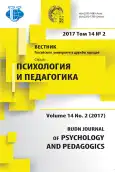THE ANTIQUE FOUNDATIONS FOR THE UNITY OF EDUCATION
- Authors: Krikunov A.E1
-
Affiliations:
- Yelets State Ivan Bunin University
- Issue: Vol 14, No 2 (2017)
- Pages: 226-236
- Section: Articles
- URL: https://journal-vniispk.ru/2313-1683/article/view/347530
- DOI: https://doi.org/10.22363/2313-1683-2017-14-2-226-236
- ID: 347530
Cite item
Full Text
Abstract
The author of the paper considers the unity of education as a specific way of existence, blurring the distinction between ontological and anthropological interpretations of education. This approach is supposed to adequately identify the philosophic sense of the category of education without linking it exclusively to the philosophic consideration of educational practice. The author also points out the connection between the ideas of the world unity and of a human being’s education as a process of gradual approaching one’s true and complete image in the history of European philosophy. Even though the contemporary notion of education is most elaborately presented by classical German philosophers, the author aims to show the prospects of addressing the antique philosophic tradition proposing the first conceptualization of education connected with a special ontological position. The author calls attention to the gradual development of views on the systemic nature of being, linking it to the initial didactic guideline of Greek philosophers. The example of Aristotle’s ethics proves the integrity of externally separate ways of making up of a person. The author comes to a conclusion about the necessity of taking the connection of educational concepts and a characteristic tendency to create the philosophic theory of the world, the elements of which are united in an integrated system, into account. In the author’s opinion, it will allow to define the real philosophic and pedagogical sense of the revision of the classical philosophic tradition, undertaken by the contemporary philosophy.
Keywords
About the authors
Alexander E Krikunov
Yelets State Ivan Bunin University
Author for correspondence.
Email: akr1975@mail.ru
Doctor of Pedagogy, Associate Professor, Full Professor of the department of Philosophy and Social Sciences, Yelets State Ivan Bunin University (Elets, Russia)
Communarov str., 28, Yelets, Russia, 399770References
- Aristotle. (1983). Collected Works. Vol. 4. Мoscow: Mysl’ Publ. (In Russ.).
- Aristotle. (1999). Nicomachean Ethics. Cambridge.
- Cassin, B. (2000). Effekt sofistiki. Moscow–St.Petersburg: Moskovskiy filosofskiy fond, Universitetskaya kniga, Kul'turnaya initsiativa. (In Russ.).
- Dewey, J. (1916). Democracy and education. An introduction to the philosophy of education. New York: The Macmillan Company. 460 p.
- Fragmenty rannikh grecheskikh filosofov. (1989). Vol. I. Мosсow: Nauka Publ. (In Russ.).
- Gadamer, H.-G. (1990). Hermeneutik I. Wahrheit und Methode. Grundzüge einer philosophischen Hermeneutik. Tübingen: Mohr Siebeck.
- Hegel, G.W.F. (1994). Lectures on the History of Philosophy. Vol. 2. St.Petersburg: Nauka Publ. (In Russ.).
- Heidegger, M. (1992). Gesamtausgabe. Band 54. Parmenides. Frankfurt am Main: Vittorio Klostermann Verlag.
- Heidegger, M. (2000). Überwindung der Metaphysik. In.: M. Heidegger. Gesamtausgabe. Band 7. Vorträge und Aufsätze (1936–1953). Frankfurt am Main: Vittorio Klostermann Verlag.
- Henn, M.J. (2003). Parmenides of Elea. A Verse Translation with Interpretative Essays and Commentary to the Text. Westport: Praeger Publishers.
- Jaeger, W. (1989). Paideia. Die Formung des griechischen Menschen. Berlin, New York.
- Karpov, A.O. (2016). Cultural and Historical Episteme of Education: from Antiquity to the Knowledge. Voprosy Filosophii, (1), 5–16. (In Russ.).
- Lessing, G. (1995). Vospitanie chelovecheskogo roda. Liki kul'tury: Al'manah. Tom pervyi (pp. 479-499). Moscow: Jurist Publ. (In Russ.).
- Meider, V.A., Gromova, E.A. (2007). Paideiya i aleteiya: Ocherki filosofii obrazovaniya. Volgograd: Volgogradskoe nauchnoe izdatel'stvo. (In Russ.).
- Ortega y Gasset, J. (2002). Dve glavnye metafory. K dvukhsotletiyu Kanta. In: J. Ortega y Gasset. The Revolt of the Masses (pp. 463–481). . Mosсow: AST Publ.
- Polonskii V.M. Slovar' po obrazovaniyu i pedagogike. Moscow: Vysshaya shkola Publ (In Russ.).
- Verbitsky, A.A. (2016). Education in the modern educational paradigm. Pedagogika, (3), 3–16. (In Russ.).
Supplementary files









